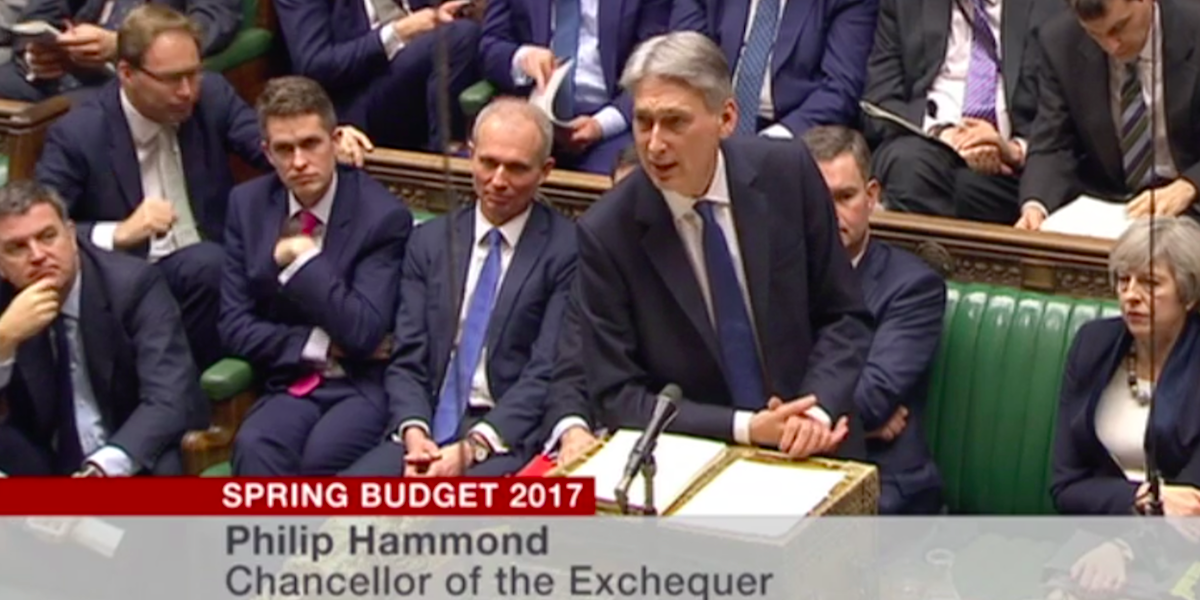 BBC
BBC
- Hammond delivers his first budget.
- Office for Budget Responsibility increases UK growth forecast from 1.4% to 2% in 2017.
- Forecasts for 2018, 2019, 2020 all lower than previous estimates.
- Corporation tax set to fall to 17% by 2020.
LONDON — Chancellor Philip Hammond is in the process of delivering his first budget to the House of Commons.
Hammond, who became chancellor last July, stepped up to the dispatch box in Parliament just after 12.30 p.m. GMT (7.30 a.m. ET) on Wednesday to give his first formal budget speech. It is not his first fiscal policy statement, however — he delivered one Autumn Statement in late November 2016.
The budget will be the last to be held in the spring, before it is moved to the autumn.
“We are building the foundations of a stronger, fairer, and more global Britain,” Hammond told the Commons.
“Our task today is to prepare Britain to take the next steps for a global future.”
Hammond confirmed that the independent Office for Budget Responsibility has increased the UK’s predicted GDP growth in 2017 from 1.4% in November to 2% today. In 2018, the OBR’s forecast stands at 1.6%. GDP growth will increase to 2% by 2021.
The OBR’s forecast for inflation in 2017 is 2.4%, lower than the 2.8% figure forecast by the Bank of England. Inflation will remain broadly unchanged at 2.3% in 2018, before hitting the bank’s official target of 2% in 2019.
Here’s a snapshot of economic data announced by the Chancellor #Budget2017pic.twitter.com/m3Lq5e1VtQ
— HM Treasury (@hmtreasury) March 8, 2017
The budget confirmed that corporation tax rates in the UK will continue to fall in coming years. “From April this year, it [Corporation Tax] will fall to 19%, the lowest rate in the G20. In 2020 it will fall again to 17%,” Hammond said.
Hammond hit back at the fiscal policies proposed by the opposition Labour party, saying that the Conservative government will persist with its economic plan. “By the way, they don’t call it the last Labour government for nothing,” he joked.
Hammond, Britain’s most senior fiscal policymaker, is focusing on portraying Prime Minister Theresa May’s government as a steady hand at the wheel as Britain steers through the rough seas of Brexit. With growth expected to slow markedly in the face of economic uncertainties around leaving the EU, Hammond will need to reassure the public that he is prepared for a rough few years for the UK economy.
Earlier on Wednesday, the chancellor told cabinet colleagues that today’s budget “lays the foundations of a Britain that works for everyone. It maintains stability, increases our economic resilience and prepares Britain for a highly skilled global future outside of the European Union,” a Downing Street source told Business Insider.
“He set out the main themes which he said were helping people get the skills they need to do high-paid, high-skilled jobs in the future, give more children the chance to go to a good or outstanding school and continues to bring down the deficit so we can get back to living within our means,” the source added.
UK GDP has now grown in 16 consecutive quarters. The last time UK GDP shrunk over a quarter was in Q4 of 2012, when the economy readjusted to normality following a huge boost from the 2012 Olympic Games in London.
However, many Brits are still struggling to make ends meet, and the government has been roundly criticised by the Labour party in the run-up to the budget.
“The Tories say they are on the side of working families, but they are going ahead with cuts to in-work benefits, and presiding over an economy where six million people earn less than the living wage, and four million children are in poverty,” Shadow Chancellor John McDonnell said in a statement on Tuesday evening.
This post will be updated continuously as Hammond delivers the budget.













